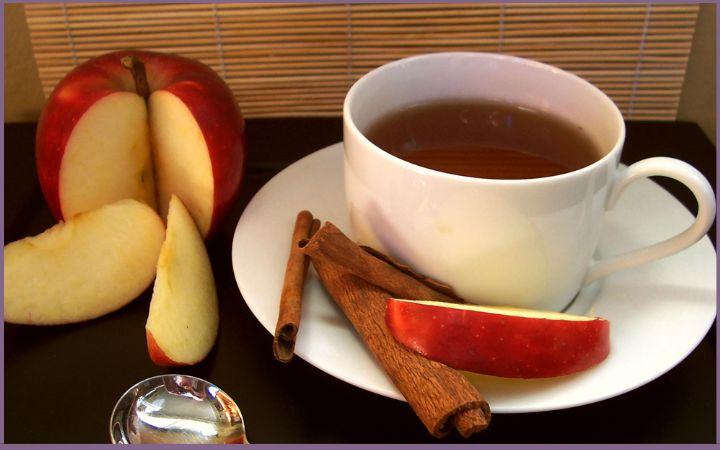As an Amazon Associate I earn from qualifying purchases. See Full Disclosure Here
Cinnamon is a fragrant, versatile spice that’s derived from the inner bark of the cinnamon tree. When removed, the bark curls into rolls while drying, forming the rolled cinnamon quills that are so easily recognizable.
Cinnamon sticks add more than just flavor to savory and sweet dishes. They are packed with compounds that offer a long list of health benefits.
Cinnamon tea is one way to enjoy this fragrant spice. The brew is made by steeping whole or ground cinnamon in boiling water.
This aromatic beverage has been used for centuries in traditional medicine. The benefits of cinnamon tea range from boosting immunity and supporting weight loss to improving digestion and regulating blood sugar levels.
My experiment with this brew started with advice from my doctor as a way to control my sugar levels. Over the past few years, I’ve read several research studies on cinnamon tea benefits and experimented with different cinnamon tea recipes, which I’ve shared below.
Brewing the Perfect Cup of Cinnamon Tea
 Making cinnamon tea is a straightforward process, but there are a few variations you can try to tailor the flavor to your liking.
Making cinnamon tea is a straightforward process, but there are a few variations you can try to tailor the flavor to your liking.
To brew a cup of classic cinnamon stick tea you need just two ingredients – cinnamon sticks and water.
Classic Cinnamon Tea Ingredients
• 2 cinnamon sticks (add more or less to your taste preference)
• 1 cup water
• Optional: honey or sweetener of choice
7 Steps to Making Cinnamon Tea
1. Boil the water in a teapot or saucepan.
2. Break the cinnamon sticks to release the flavor and add to the boiling water.
3. Reduce the heat and leave for another 1 – 2 minutes.
4. Put off the head and let the cinnamon steep in the hot water for another 5 minutes. Steeping extracts the beneficial compounds from the cinnamon and also intensifies the taste.
5. Strain the tea to remove the cinnamon sticks.
6. Add honey or your preferred sweetener if desired.
7. Pour the tea into your favorite mug or teacup and enjoy the comforting warmth and flavor of this classic cinnamon tea.
Adjust the ratio of water and spice to your taste preferences. I started with a small piece and gradually increased the amount over time.
If you prefer a stronger flavor, let the cinnamon steep for a longer time.
How To Choose High-Quality Cinnamon
 The key to the perfect cup lies in choosing high-quality cinnamon sticks or powder.
The key to the perfect cup lies in choosing high-quality cinnamon sticks or powder.
Look for cinnamon that has a rich, fragrant aroma, and rich brown color. Avoid cinnamon that appears dull or has a strong chemical smell, as these may indicate lower quality.
Cinnamon is available in various forms, each offering unique flavors and health benefits. The two most commonly used types of cinnamon are Ceylon cinnamon and Cassia cinnamon.
Ceylon cinnamon, also known as Sri Lankan cinnamon or true cinnamon, is considered the superior variety due to its milder and sweeter taste. It also contains lower levels of coumarin, making it a safer choice for regular consumption.
It’s easy to differentiate Ceylon cinnamon from other varieties. It is lighter in color, softer to the touch, and comes in rolled layers.
Cassia cinnamon, also known as Chinese cinnamon, is darker brown, hard, and has only one slightly curled layer. It has a strong and slightly spicy flavor. However, it contains higher levels of coumarin, which can be harmful when consumed in large quantities.
Both types of cinnamon offer health benefits, but if you are planning to incorporate this brew into your daily routine, it’s advisable to opt for Ceylon cinnamon to minimize the risk of potential side effects.
Cinnamon Tea Recipes
 Cinnamon tea is versatile and can be combined with a variety of herbs and spices. with black tea, green tea, or herbal teas like chamomile for a unique twist in flavor and health benefits.
Cinnamon tea is versatile and can be combined with a variety of herbs and spices. with black tea, green tea, or herbal teas like chamomile for a unique twist in flavor and health benefits.
Cinnamon Ginger Tea: Ginger adds a refreshingly spicy kick to the brew. It is also a very effective digestive aid. One of the most common uses of cinnamon ginger tea is to boost digestion.
Cinnamon Lemon Tea: Lemon provides a refreshing tanginess that balances the richness of the cinnamon. In addition to a citrus flavor, lemon also boosts the vitamin C content of the brew. Top of the long list of cinnamon lemon tea benefits is immune system support.
Cinnamon Honey Tea: Honey adds a natural sweetness to the tea, complementing the warm and earthy flavors of cinnamon. It provides sweetness and may contribute to antioxidant and antibacterial properties. Use raw honey for maximum goodness.
Spiced Cinnamon Tea: Add a dash of nutmeg, cloves, and ginger to your brew for a flavorful twist. These spices not only enhance the taste but also offer additional health benefits.
Cinnamon Apple Tea: Brew the classic tea recipe and add freshly sliced apples for a refreshing and fruity twist. This variation is perfect for those who enjoy a hint of natural sweetness.
Cinnamon Green Tea: Combine the goodness of green tea with the aromatic flavors of cinnamon. Steep a green tea bag along with a cinnamon stick for a revitalizing and antioxidant-rich beverage.
Cold Brew Cinnamon Tea: For a refreshing option, cool the freshly brewed beverage and let it cool before refrigerating. Serve over ice with a slice of lemon.
Cinnamon Tea Latte: Add frothed milk or a dairy-free alternative for a creamy cinnamon tea latte experience.
Cinnamon tops the list of Christmas spices. Brew any of these cinnamon tea recipes during the holidays to infuse the season with a larger dose of festive flavor.
Special Mention: Cinnamon Apple Spice Tea

You absolutely MUST try this recipe. It’s my most favorite of all. The apple adds a crisp fruity flavor to the tea while the clove and star anise add their distinct flavors resulting in an absolutely delightful brew!
Ingredients for cinnamon apple spice tea:
• 1 cinnamon stick
• 1 Rooibos tea bag
• 1/4 cup apple juice or apple cider
• ½ teaspoon whole cloves
• 1 star anise
• 1 cup water
• Optional: honey or sweetener of choice
• Sliced apples for garnish
How to Make Cinnamon Apple Tea:
– Boil the water and steep the rooibos tea bag along with the spices for 5-7 minutes.
– While the tea is steeping, heat the apple juice until warm.
– Mix the brewed tea and warm apple juice.
– Add honey or your preferred sweetener if desired.
– Garnish with sliced apples.
Enjoy this delightful blend of cinnamon and apple!
These are just a few examples of the many ways you can enjoy cinnamon tea. Feel free to experiment with different ingredients and flavors to find your perfect cup of cinnamon-infused goodness.
Other Creative Ways To Incorporate Cinnamon Into Your Daily Routine
There are many other creative ways to incorporate this aromatic spice into your daily routine.
Here are a few ideas to get you started:
Sprinkle cinnamon on your morning oatmeal or cereal for a warm and flavorful kick.
Add a dash of cinnamon to your coffee or hot chocolate for a cozy and indulgent treat.
Blend cinnamon into smoothies or protein shakes for an added burst of flavor and health benefits.
Use cinnamon as a seasoning for roasted vegetables, such as sweet potatoes or carrots, to elevate their taste.
Mix cinnamon into your pancake or waffle batter for a delicious twist on a classic breakfast.
Research-Backed Benefits Of Cinnamon Tea
It’s An Antioxidant Powerhouse
The rich cinnamaldehyde content of cinnamon is responsible for its anti-microbial properties, which help protect the body from damage caused by free radicals.
Free radicals are known to contribute to aging and various chronic diseases. By incorporating cinnamon tea into your routine, you provide your body with a natural defense mechanism against oxidative stress.
Has Potent Anti-Inflammatory Properties
Inflammation is a way in which the body responds to an injury or infection. While this is an essential repair and healing mechanism, chronic inflammation can damage the body’s tissues. Chronic inflammation is a chronic factor in several age-related issues.
A study that tested 115 foods, found that Sri Lankan or Ceylon cinnamon had the most potent anti-inflammatory properties. This study tested the results further and suggests that cinnamon and its components may be valuable in managing age-related inflammatory conditions if therapeutic concentrations can be achieved in target tissues.
Another study found that Ceylon cinnamon possesses anti-inflammatory properties that can help manage many disorders including allergic inflammation.
Regular consumption of cinnamon in any form can be a tasty way to promote a healthier inflammatory response in the body.
Regulates Blood Sugar
One of the most talked about benefits of cinnamon tea is its ability to help regulate blood sugar levels. But does it really work?
Here’s what I found in reading through several clinical trials on the connection between cinnamon and diabetes.
In an interesting study to determine whether cinnamon improves blood glucose, 60 people with type 2 diabetes were divided randomly into six groups. Five groups consumed a different quantity of cinnamon daily, and one consumed placebo capsules for 40 days. The study demonstrated that including cinnamon in your diet can reduce risk factors associated with type 2 diabetes and cardiovascular diseases.
Some studies such as this, suggest that consuming cinnamon regularly may help to overcome insulin resistance. Insulin resistance is a contributory factor in type 2 diabetes. By overcoming insulin resistance and increasing insulin sensitivity, cinnamon helps to support better blood sugar control.
There’s sufficient evidence to indicate that cinnamon is a valuable tool if you have type 2 diabetes and are looking to manage your blood sugar levels.
Offers Immune System Support
Cinnamon tea is a natural immune booster, thanks to its antimicrobial properties. It contains compounds that can help fight off harmful bacteria and viruses, reducing the risk of infections.
Some studies have also suggested that cinnamon may protect regulatory T cells, or “Tregs,” which regulate immune responses.
During periods of increased susceptibility to illness, such as cold and flu seasons, consider incorporating this spice into your daily routine as part of a holistic approach to immune system support.
Drinking cinnamon tea regularly can help strengthen the immune system, keeping you healthy and protected. Of course, you must combine it with a balanced diet, regular exercise, and sufficient sleep to keep your immune system strong and resilient.
May Support Weight Loss
If you’re on a weight loss journey, cinnamon tea can be a helpful addition to your routine. It is believed to aid weight loss by boosting metabolism and reducing cravings.
Cinnamon contains compounds that contribute to a feeling of fullness, potentially reducing overall calorie intake.
Additionally, the brew has a naturally sweet flavor, which can satisfy your sweet tooth without the need for added sugars or artificial sweeteners.
Moreover, by stabilizing blood sugar levels, cinnamon prevents sudden spikes and crashes that can lead to overeating.
Although several studies have been done on the benefits of cinnamon for weight loss the results may be skewed because they essentially did not differentiate between muscle loss and fat loss.
To maximize the potential weight loss benefits of cinnamon tea, it is important to maintain a balanced diet and engage in regular physical activity. Herbs and spices should be seen as a complementary part of a healthy lifestyle, rather than a magic solution for weight loss.
Has Potent Antibacterial Properties
The antibacterial properties and mechanisms of cinnamon are well documented in this study.
It found that cinnamon exhibits a broad spectrum of antibacterial activity and is effective in inhibiting about 10 bacterial species that cause dental caries. The study suggested that cinnamon oil is more effective in treating dental caries than clove oil, which has traditionally been considered the best remedy for toothache.
Aids Digestion
Among the many benefits of cinnamon tea is its ability to improve digestion. It stimulates the production of digestive enzymes, which aids in the breakdown of food and promotes better nutrient absorption. Regular consumption of cinnamon tea can help alleviate digestive issues such as bloating, gas, and indigestion.
Potential Side Effects And Precautions Of Cinnamon Tea
While cinnamon tea offers numerous health benefits, it is essential to be aware of potential side effects and take precautions.
Consuming excessive amounts of cinnamon can lead to liver damage due to the presence of coumarin, a compound found in certain types of cinnamon.
You must limit your intake to moderate amounts and choose cinnamon varieties with lower coumarin levels, such as Ceylon cinnamon.
Additionally, any herb or spice may interact with certain medications, including blood thinners or medications for diabetes. If you are taking any medications, it is advisable to consult with your healthcare provider before incorporating herbs or spices into your routine.
Cinnamon tea is not only a delightful beverage but also a powerhouse of health benefits. From improving digestion and regulating blood sugar levels to boosting the immune system and aiding in weight loss, cinnamon tea offers a multitude of advantages for your overall well-being.
Remember to consult with your healthcare provider before making any significant changes to your diet, especially if you have any underlying health conditions or are taking medications.
Related Reads:
Chamomile tea benefits + delicious recipes
Research-backed benefits of lavender tea + how to make & recipes
Delicious healing herbal teas for any time of the year
Top 10 herbal teas for anxiety
Cinnamon essential oil benefits, uses, & cautions
Disclaimer: This information is not intended to serve as medical advice. Please consult your doctor before using any natural medication or if you experience any unusual symptoms. See Full Disclaimer here.









